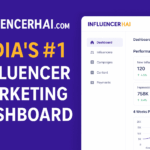Influencer marketing is a powerful tool to help your business reach new customers. On the other hand, there are some important pros and cons to consider before going all-in on influencer marketing. Let’s look at the pros and cons of the marketing strategy so you can make an informed decision about whether or not to integrate it into your social media plan.
Influencer marketing is a common strategy for brands to reach their target audiences. This approach works by partnering with top-of-mind influencers with loyal followers to promote a product or service. Influencer marketing can be effective for many products and services—from food and cosmetics to cars and travel to beauty products like makeup brushes or nail polish bottles. But influencer marketing isn’t just about reaching consumers. It’s also great for brands to learn more about how they engage with their customers on social media platforms like Instagram or Facebook.
Influencer marketing is a measurable metric.
One of the fascinating aspects of influencer marketing is that it can provide immediate feedback on a product before it’s launched. This can be a huge benefit for brands looking for ways to improve their products and services or even just getting insight into what consumers think about them.
Influencers are often the first customers to try new products, offering valuable insights.
In addition to providing feedback on your product, influencers can also provide feedback based on their personal preferences. It will also help to guide the audience’s decision to purchase the product!
The most significant benefit of influencer marketing is that it can drive sales for your eCommerce business.
When influencers post about a new product or service, their followers are likelier to buy it. This is because influencers have millions of people who trust them and listen when they recommend something new.
Influencers also post content on social media which drives traffic back to the brand website where they sell their products and services.
You’ll likely get more engagement with influencer content because people are more likely to interact with it. You’re also more likely to see your followers share and spread the word about your brand, which can be powerful for building brand awareness and increasing sales.
Influencers typically have a following of loyal customers who are ready and willing to buy from them when they recommend a product or service that aligns with their interests. They know what works for them and why—and those insights can help guide you as well!
Influencers are a great way to reach a specific demographic. They often have a good sense of what their audience wants and can help brands identify their target audience. Before working with you, you must know your influencers and what they do. However—this will help ensure the most effective communication between the brand and the targeted audience.
There are tons of influencers, and they all have different audiences. It will help if you discover the right influencer for your brand and product to reach your target audience.
Influencers are notorious for being fake or having ulterior motives when posting content. For example, suppose an influencer is trying to promote their clothing line on social media with little concern for whether it fits in with the rest of their followers’ interests. In that case, this could backfire on them regarding legitimacy and trustworthiness (especially if many people see through this).
It may take a lot of work to match influencers with the brand. Influencers have different styles and audiences, so you need to know what you want from your campaign before looking for influencers.
It will help if you’re clear on what the influencer can deliver in content production and marketing strategy and how they will work with teams in your organization.
Influencers are also very effective at building brand affinity, which can lead to more loyal customers. If you’re thinking about working with an influencer on your next campaign, keep these pros and cons in mind before making your decision:
From the perspective of people interested in influencer marketing, the pros outweigh the cons. Influencer marketing is a powerful way to reach your target audience. Often, it yields greater engagement than traditional social media posts because it gives the audience to interact with your content. It can help boost your social media presence without too much effort or money and bolster your relationship with your clients.
Influencer marketing is an effective way to increase awareness and drive sales for your brand. But it’s not a panacea. Influencers can’t help if their followers aren’t interested in the product or don’t trust the brand. Inevitably InfluencerHai ensures everything from aligning the right influencer to publishing the ad campaign with the targeted audience.
InfluencerHai works closely with influencers and brands on everything from strategy to implementation and measurement so that both parties feel like we’re progressing toward the same goals—and keeping things honest along the way!
